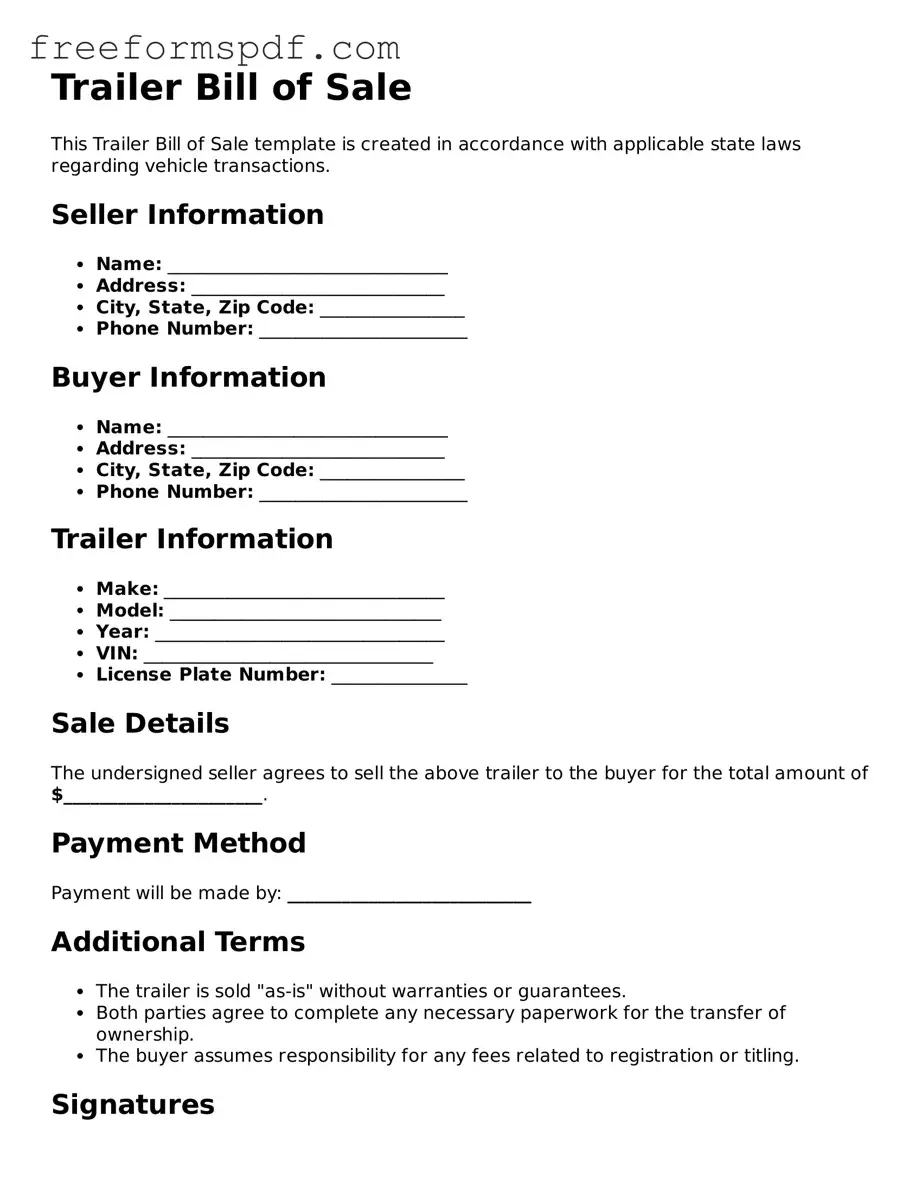Trailer Bill of Sale Document
Trailer Bill of Sale - Customized for Each State
Common mistakes
-
Incorrect Information: People often fill out the form with inaccurate details about the trailer. This includes the wrong Vehicle Identification Number (VIN), incorrect make or model, or even errors in the seller’s or buyer’s names. Double-checking all information is crucial.
-
Missing Signatures: A common mistake is neglecting to obtain necessary signatures. Both the seller and buyer must sign the document for it to be valid. Without these signatures, the sale may not be legally recognized.
-
Omitting Sale Price: Some individuals forget to include the sale price on the form. This detail is important not only for the transaction but also for tax purposes. Always ensure that the sale price is clearly stated.
-
Failure to Date the Document: Another frequent oversight is not dating the bill of sale. The date is essential as it marks when the transaction occurred. Without it, there could be confusion regarding the timing of the sale.
Learn More on This Form
-
What is a Trailer Bill of Sale form?
A Trailer Bill of Sale form is a legal document used to transfer ownership of a trailer from one party to another. This form typically includes essential details such as the trailer's make, model, year, Vehicle Identification Number (VIN), and the names and addresses of both the seller and buyer. It serves as proof of the transaction and can be required for registration purposes with state authorities.
-
Why is it important to have a Trailer Bill of Sale?
Having a Trailer Bill of Sale is crucial for several reasons. First, it provides legal evidence of the transaction, which can help resolve any disputes that may arise later. Second, it ensures that the buyer can register the trailer in their name, which is often required by state law. Lastly, it protects both parties by documenting the sale, including the agreed-upon price and any conditions of the sale.
-
What information is typically included in the form?
The Trailer Bill of Sale form generally includes the following information:
- The names and addresses of the seller and buyer
- The trailer's make, model, and year
- The Vehicle Identification Number (VIN)
- The purchase price
- The date of the sale
- Any additional terms or conditions agreed upon by both parties
Including accurate and complete information helps ensure the document is valid and can be used effectively for registration and legal purposes.
-
Do I need to have the Trailer Bill of Sale notarized?
Notarization requirements for a Trailer Bill of Sale can vary by state. In many cases, notarization is not necessary, but it may be recommended to add an extra layer of authenticity to the document. Some states may require a notarized bill of sale for registration or titling purposes. It is advisable to check the specific requirements in your state to ensure compliance.
Misconceptions
The Trailer Bill of Sale form is an important document for anyone buying or selling a trailer. However, several misconceptions surround this form. Here are eight common misunderstandings:
- It’s not necessary for small trailers. Many people believe that if a trailer is small or inexpensive, a bill of sale isn’t needed. In reality, having a bill of sale protects both the buyer and seller, regardless of the trailer's size or value.
- It can be verbal. Some think that a verbal agreement is sufficient for selling a trailer. However, a written bill of sale is crucial for legal protection and to provide proof of the transaction.
- Only the seller needs to sign it. Many assume that only the seller’s signature is required. In fact, both the buyer and seller should sign the document to validate the transaction.
- It’s only for used trailers. Some people think that a bill of sale is only necessary for used trailers. New trailers also require this document to ensure proper ownership transfer.
- It doesn’t need to include details. There’s a belief that a simple statement of sale is enough. However, a comprehensive bill of sale should include details like the trailer’s make, model, year, and Vehicle Identification Number (VIN).
- It’s the same as a title. Some confuse a bill of sale with a title. While a title proves ownership, a bill of sale documents the transaction and can be used to apply for a title.
- It’s only needed in certain states. Many think that a bill of sale is only necessary in specific states. In truth, it’s a good practice in all states to have this document for record-keeping and legal purposes.
- It’s a complicated process. Some people feel overwhelmed by the idea of creating a bill of sale. In reality, it’s a straightforward process that can be done with simple templates available online.
Understanding these misconceptions can help ensure a smooth transaction when buying or selling a trailer. Always prioritize having the right documentation to protect your interests.
Other Types of Trailer Bill of Sale Forms:
Simple Bill of Sale for Car - The Bill of Sale can identify any warranties or guarantees made by the seller regarding the vehicle.
Understanding the ADP Pay Stub form is essential for employees as it delivers comprehensive insights into their earnings and deductions for each pay period, facilitating better financial management. For those looking for efficient ways to organize their pay information, resources like Fast PDF Templates can be invaluable in providing templates that simplify the process.
Business Bill of Sale Template - Can serve as an attachment to other legal documents related to the sale.
